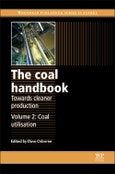Part one is an introductory section which reviews the social and economic value of coal, emissions from coal utilisation, the handling, impact and utilisation of coal waste, and an exploration of emerging and future issues around industrial coal utilization. Chapters in part two highlight coal resources, production and use in established markets as well as the emerging markets of Brazil, the Russian Federation, India, Indonesia, and China. Part three focuses specifically on coal utilisation in industry. Chapters consider thermal coal utilisation, coal use in iron and steel metallurgy, advances in pulverised fuel technology, and the evaluation of coal for thermal and metallurgical applications. Further chapters explore coal utilisation in the cement and concrete industries, coal gasification and conversion, and value-in-use assessment for thermal and metallurgical coal. A final chapter summarises the anticipated future pathway towards sustainable, long-term coal use, suggesting transitions that will be needed to ensure cleaner utilisation for many decades to come.
With its distinguished editor and international team of expert contributors, The coal handbook Volumes 1 and 2 is a comprehensive and invaluable resource for professionals in the coal mining, preparation, and utilisation industry, those in the power sector, including plant operators and engineers, and researchers and academics interested in this field.
Table of Contents
Part I: Introduction
Chapter 1: Social and economic value of coal
Chapter 2: Environmental issues: emissions, pollution control, assessment and management
Chapter 3: Coal waste: handling, pollution impacts and utilization
Chapter 4: Future industrial coal utilization: forecasts and emerging technological and regulatory issues
Part II: Global coal production
Chapter 5: Coal resources, production and use in established markets
Chapter 6: Coal resources, production and use in Brazil
Chapter 7: Coal resources, production and use in the Russian Federation
Chapter 8: Coal Resources, Production and use in India
Chapter 9: Coal Resources, Production and Use in Indonesia
Chapter 10: Coal Resources, Production and Use in China
Part III: Coal utilisation in industry
Chapter 11: Thermal coal utilization
Chapter 12: Coal use in iron and steel metallurgy
Chapter 13: Advances in pulverised fuel technology: understanding coal comminution, combustion and ash deposition
Chapter 14: Evaluation of coal for metallurgical applications
Chapter 15: Coal utilisation in the cement and concrete industries
Chapter 16: Coal gasification and conversion
Chapter 17: Value-in-use (VIU) assessment for thermal and metallurgical coal
Chapter 18: Future directions toward more efficient and cleaner use of coal








